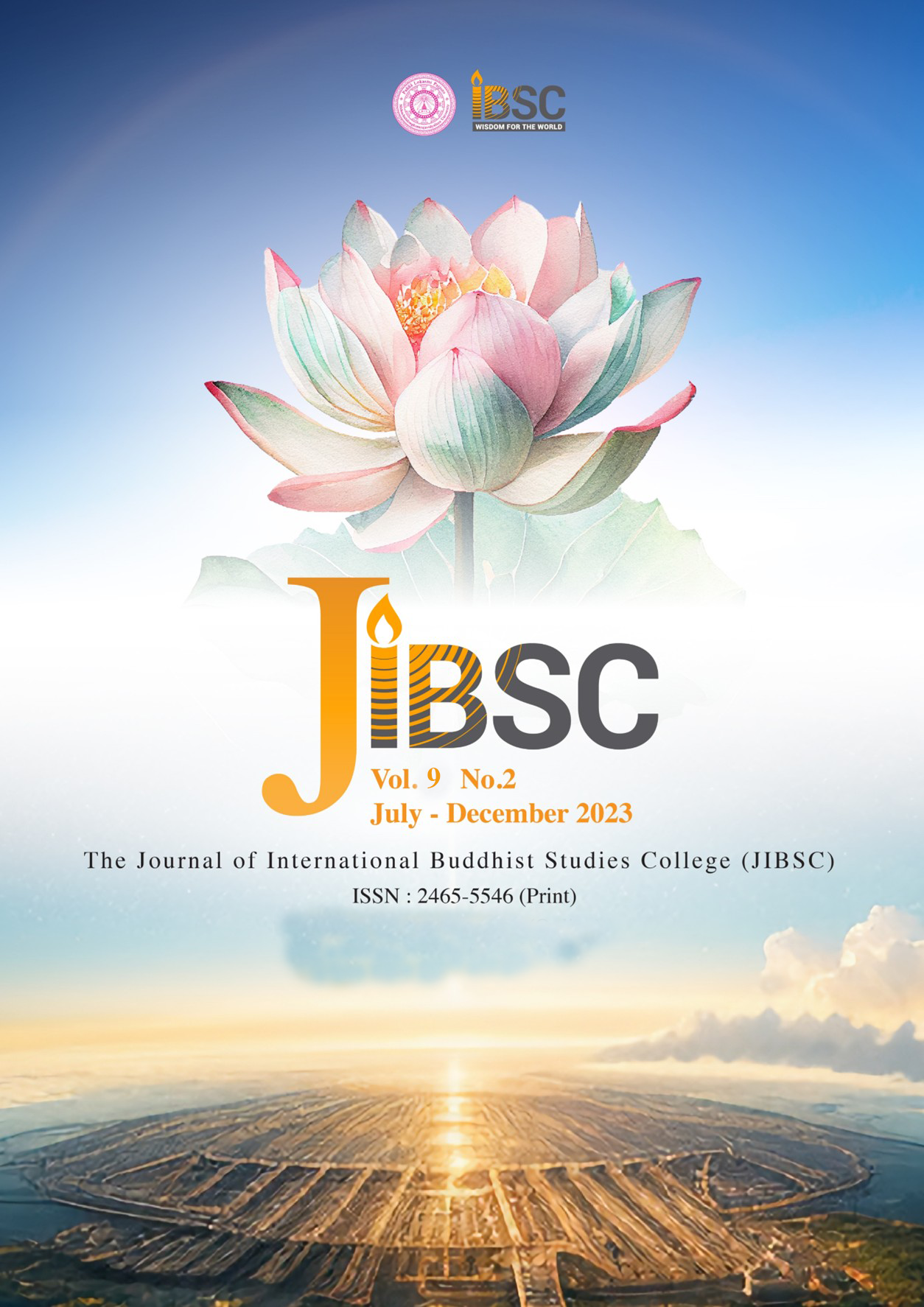The Development of Buddhist Peace Model for Non-Violence in Modern Society
Main Article Content
Abstract
This objective-driven research endeavor has pursued three fundamental aims: 1) To comprehend the intricate dynamics, issues, and fundamental causes of violence, while delving into concepts and theories of peacebuilding to advocate non-violence within present-day society; 2) To scrutinize the role of Buddhist principles in nurturing non-violence amid contemporary societal dynamics; and 3) To craft a tailored Buddhist Peace Model geared towards advancing non-violence within modern societal landscapes. Methodologically, this study has harnessed a comprehensive approach, integrating documentary research encompassing academic Buddhist literature, textual commentaries, the Pali Dictionary, theses, articles, journals, and in-depth interviews.
The outcomes of this investigation into the formulation of a Buddhist peace model for non-violence in modern society offer valuable insights: (1) a thorough analysis of prevailing conditions, challenges, and root causes of violence, alongside the conceptual frameworks and strategies for peacebuilding conducive to fostering non-violence in contemporary society; (2) an exploration of Buddhist
methodologies and practices conducive to upholding non-violence in contemporary societal contexts; (3) the proposition of methodologies for constructing a Buddhist peace model aimed at propelling non-violence within contemporary societal realms; and (4) the identification and explication of various Buddhist Peace Models specifically tailored to address non-violence within the framework of modern society.
The research highlights the significance of studying the development of a Buddhist peace model in modern society, identifying two key sub-categories: practicing precepts and developing morality, and building a harmonious modern society through moral cultivation. These sub-categories are deemed crucial and are expected to play a pivotal role in the development of the Buddhist Peace Model for promoting non-violence in contemporary society. Thus, the article focuses on exploring the development of the Buddhist Peace Model for Non-Violence in Modern Society.
Article Details
The Journal of TCI is licensed under a Creative Commons Attribution-NonCommercial-NoDerivatives 4.0 International (CC BY-NC-ND 4.0) licence unless otherwise stated. Please read our Policies page for more information on Open Access, copyright and permissions.
References
Bhikkhu Bodhi, Soma Thera. Kalama Sutta Cetakan Pertama: February 2010.
Bhikkku Bodi. (ed) Going for refuge taking the precepts. Kandy, Sri Lanka: BPS 1981.
Bluck, Robert. British Buddhism: Teachings. Practice and Development. London: Book
press, 2011.
Boyer, pascal. Religion Explained: The Evolutionary Origins of Religious taught. New York:
Brian Schell. The Five Minutes Buddhist’s Buddhism Quick Start Guide CreateSpace,
Buddhism. Srilanka:University of Sri Jayewardenepura, 2015.
Chappell, D. W. Buddhist Peace work: Creating Cultures of Peace
Dīgha Nikāya.Vol,I,II,III. wisdom publication,1986
Geertz, Clifford. The Interpretation of Cultures. New York: Book Press, 1977.
Hopkins. Peacebuilding and Reconciliation stage. New York City: Ithaca Snow Lion, 2000.
Independent publishing Platform,2015.
James J. Hughes. World Buddhism and the Peace movement, Bulletin of Peace proposals,
John Paul Lederach, The Moral Imagination: The Art and Soul of Building Peace. Oxford.
Karunarathne W.S..Buddhist Essays. Colombo:Samaranayaka Publication, 1993.
Nataraju, Adarasupally, Phramaha Somphong Unyo, and Phrapalad Somchai Damnoen. "Philosophy of Creating Peace in Buddhism." Mahachula Academic Journal 4.2 (2017): 185-195.
Nilanthi Ratnayake, Manifestation of Ethical Consumption Behaviour through Five Precepts of
Oxford University press, 2005.
Shundo Tachibana. The Ethics of Buddhism. Routledge Taylor and Francis group, 1995.
Swearer DK. Religion world order and peace: Buddhist responses. Blackwell, 2010.
Thero, Wadigala Samitharathana. “The Buddhist Real Concept of Peace in Theory and Up Wards (Pa? isotag? m?) Practice Which Towards on Philosophical Revelation.” Journal of Advanced Research in Social Sciences 2.4 (2019): 40-56.
T,K, Unnithan. Traditions of Non-violence.New Delhi : Arnold Heinemann.,1973.
T.W. Rhy David. (trans) Dialogues of the Buddha vol. II. London: Pali Text Society,1995.
University press, 2005.
Ven. Mingun Sayadaw. The Great Chronicle of Buddha’s (wisdomlib.org published) 1990.
Venerable Thich Nhat Hanh.The heart of the Buddha’s teaching. Random house, 1999.
Webel, Charles, and Johan Galtung, eds. Handbook of peace and conflict studies. Vol. 7. London: Routledge, 2007.


